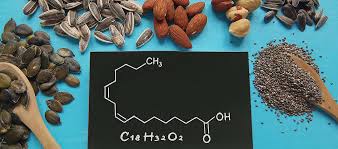You may have heard the consumption of too many omega fatty acids can result in severe health issues like heart problems and inflammation. On the other hand, omega-6 fatty acids are examples of linoleic acid. Linoleic acid, an essential polyunsaturated omega-6 fatty acid, is commonly found in vegetable oils, nuts, seeds, and many processed foods. It helps in making the brain function to work properly, metabolism and development. Since it is considered essential for health, recently many concerns are raised about its negative impact on health. According to a recent study, excessive consumption of linoleic acid can lead to chronic inflammation, increase the ratio of heart problems among many people and can also disturb the balance between omega-6 and omega-3 fatty acids. This raises many debates on whether linoleic acid is harmful if you consume it in large amounts or not. In this article we will explore Is Linoleic Acid Bad for You? Understanding Its Impact on Health and benefits of linoleic acid, the science behind its effects, and how it fits into a healthy diet.
Is Linoleic Acid Bad for You? No, It is not if you consume it in a balanced and moderate quantity.
What Is Linoleic Acid?
An essential polyunsaturated omega-6 fatty acid found mostly in plant-based oils, such as soybean oil, sunflower oil, and corn oil, as well as in nuts, seeds, and certain processed foods known as linoleic acid plays an important role in human health. The main reason why it is considered essential is that our body can’t produce it on its own, you can only get it by consuming a diet rich in it.
As an omega-6 fatty acid, linoleic acid is a key element of cell membranes. It also plays an important role in various physiological functions, including skin health, immune system support, and the regulation of inflammation. When you intake linoleic acid the body converts it into arachidonic acid, which is later used to produce a molecule known as eicosanoids. These eicosanoids play a part when it comes to blood clotting, immune response and inflammation.
Linoleic acid does have many health benefits and is essential for our health, its balance with omega-3 fatty acids is critical. When a diet that is too high in linoleic acid and too low in omega-3s can cause an imbalance between omegas, this can lead to chronic inflammation and increase the risk of various health conditions.
In order to eliminate the risk of the disease mentioned above all you need to consume both omega-6 and omega-3 in the right quantity so they are balanced, keep in mind the ratio should be around 1:1 to 2:1. Keeping a balance between omega-3 foods, may lead to some good benefits for cardiovascular health, brain function, immunity, skin health and bone strength.
Conjugated Linoleic Acid
Conjugated Linoleic Acid (CLA) is a type of fatty acid, it can be found on animal products specially in meat and dairy items of animals like cows and sheep. It is a specific isomer of linoleic acid, meaning the microbes found in gastrointestinal tract of animals like grass-fed beef, lamb, and dairy products, convert linoleic into CLA from a process known as biohydrogenation. Although the structure of CLA is quite similar with linoleic acid, The only difference is their locations of bonds. Some benefits of CLA are weight loss, muscle mass improvement, reducing inflammation and supporting the overall immune system as well as health. The side effects of CLA is insulin resistance also it does not provide long term benefits for our health.
Oleic Acid
Oleic Acid is a monounsaturated fatty acid (MUFA), can be found in both animal as well as plant based foods, like Olive oil. It is the main primary fatty acid found in olive oil accounting for around 55-83% of its composition, and is also present in other oils like canola oil, avocado oil, and macadamia nut oil. Whereas in animals it is found in average amounts in animal fats from poultry and beef.
oleic acid has many benefits when it comes to health, it is considered good for overall heart health as it reduces the risk of increasing cholesterol levels by increasing high-density lipoprotein (HDL) cholesterol and reducing low-density lipoprotein (LDL) cholesterol. This results in good heart health by reducing risk of heart attack and other heart problems.
Is linoleic acid bad for you?
The answer is no! Linoleic acid is not that bad for you. It is considered an essential omega-6 fatty acid, which can’t be produced naturally by our body. It plays an important role in overall body health like supporting skin health, promoting heart function, and aiding in cellular repair. You can get linoleic acid from plants like soybean, sunflower, and safflower oils, as well as from nuts and seeds. However there are some negative impacts if you consume it in a large amount. The reason can be imbalance in omega-6 and omega-3 fatty acids which leads to conditions like heart disease, obesity, and metabolic disorders. Therefore, while linoleic acid itself is not bad, If you take it in a balanced amount.
Linoleic acid in Foods and Oils
As we discussed earlier linoleic acid is found primarily in plant-based oils and a variety of foods, this is the main reason why it became a common part of our diet plans. As it is essential and human can not provide it by them self, All you can do is to consume it from different dietary sources, Below are some of the key foods and oils that are rich in linoleic acid:
- Soybean Oil: It contains about 50–60% linoleic acid.
- Corn Oil :It contains around 50–60% of the fatty acid. It is widely used in processed foods and frying.
- Sunflower Oil: it contains up to 70–80% linoleic acid.
- Cottonseed Oil :it contains about 50% linoleic acid.
- Walnuts: It contains approximately 10–15% linoleic acid.
Many processed and packaged foods, including baked goods, chips, crackers, and margarine, are made with vegetable oils like soybean, corn, or sunflower oil, all of which are high in linoleic acid.
Benefits of Linoleic acid
Linoleic acid, as an essential polyunsaturated omega-6 fatty acid, plays a key role in several vital functions in the body. While it is important to consume linoleic acid in balance with omega-3 fatty acids, it offers several health benefits when incorporated properly into the diet. Here are some of the key benefits of linoleic acid:
1. Supports Healthy Skin
Linoleic plays a very important role when it comes to skin health as it helps in maintaining skin integrity. It helps to form the skin’s lipid barrier, like preventing moisture loss and protects your skin against environmental irritants. If your body lacks linoleic acid, it can lead to dryness, flaky skin and also increase some serious skin conditions like eczema. Linoleic acid does contain some anti-inflammatory properties which helps to protect your skin from acne and psoriasis. According to studies, linoleic acid helps in reducing inflammation and heals your skin in various ways.
2. Heart Health
Linoleic acid has some good benefits when we talk about heart health, it plays an effective role in blood cholesterol levels. As it reduces low-density lipoprotein (LDL) cholesterol and increases high-density lipoprotein (HDL) cholesterol, This can result in improving overall heart health and save you from many heart diseases like heart attack etc. According to some studies, Omega-6 fatty acids, especially linoleic acid, helps in maintaining overall blood pressure levels.
3. Supports Cellular Health
Linoleic acid is a crucial component of cell membranes. It plays a role in maintaining the fluidity and flexibility of cell membranes, allowing for proper function and communication between cells. The fatty acid involve in cell growth and repairing process. It is essential when it comes to tissue functioning.
4. Anti-Inflammatory Effects
Linoleic acid also helps in regulating the production of eicosanoids, which layer helps in reducing chronic inflammation. Taking an excess amount of linoleic can lead to health concerns but taking it in a moderate amount do have many benefits. Due to its anti-inflammatory properties, linoleic acid can benefit individuals with inflammatory conditions like rheumatoid arthritis. Proper intake of this acid can help in reducing pain especially in joints.
5. Improved Immune Function
Another advantage of linoleic acid is it helps in overall immune health, by supporting the function in the immune system. This helps in fighting various infections. This acid also plays an important role in managing inflammatory disease. All you need to create a balance between omega-6 and omega-3.
6. Weight Management and Brain Health
Linoleic acid specially in CLA form can leads to weight loss by promoting fat oxidation and inhibiting fat storage. It also helps in improving insulin sensitivity which leads to stabilize overall blood sugar levels. Other benefits of linoleic acid it helps in repairing brain membrane cell and play a important role in neurological disorder according to Some studies suggest that an imbalance in omega-6 to omega-3 fatty acids, particularly excessive linoleic acid intake, may contribute to cognitive decline and neurological disorders.
Recommended Intake of Linoleic acid
The recommended intake of linoleic acid varies depending on factors like age, gender, and overall caloric intake. Below is a general guideline for daily intake recommendations based on various health authorities.

Risks and Side Effects of Linoleic acid
Linoleic acid is considered an essential fatty acid, which plays an important role in overall health but taking it in a large amount can lead you to some serious health concerns due to the imbalance of omega-3 and omega-6. According to some recent studies another side effect of taking a fatty acid like linoleic acid can impact fatty acid levels in growing fetuses.
Below are some of the potential risks and side effects associated with high linoleic acid intake:
- 1. Increased Inflammation.
- 2. Increased Risk of Heart Disease.
- 3. Obesity and Weight Gain.
- 4. Insulin Resistance and Type 2 Diabetes.
- 5. Increased Risk of Cancer.
Conclusion: Linoleic Acid Bad for You
In conclusion, linoleic acid is an essential omega-6 fatty acid that plays important roles in maintaining overall health, including supporting skin health, promoting heart function, and aiding in cellular processes. However, like with any nutrient, balance is key. While moderate amounts of linoleic acid are necessary for the body, excessive intake, particularly when it is not balanced with omega-3 fatty acids, can lead to negative health outcomes.
Also Read: Best Beverage Options for the Carnivore Diet: What Can You Drink?


